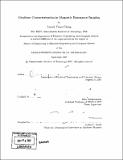Gradient characterization in magnetic resonance imaging
Author(s)
Cheng, Joseph Yitan
DownloadFull printable version (2.053Mb)
Alternative title
Gradient characterization in MRI
Other Contributors
Massachusetts Institute of Technology. Dept. of Electrical Engineering and Computer Science.
Advisor
Elfar Adalsteinsson.
Terms of use
Metadata
Show full item recordAbstract
Special magnetic resonance (MR) scans, such as spiral imaging and echo-planar imaging, require speed and gradient accuracy while putting high demands on the MR gradient system that may cause gradient distortion. Additionally, high field MR scans are prone to inhomogeneities that disturb the gradient system. Regardless of the source, gradient characterization provides a simple tool for distortion correction. An improved method, named the self-encoded slice selection algorithm, of characterizing the gradient system of the magnetic resonance system is proposed. It improves and combines the self-encode method and the direct slice selection method. The new approach is simple and fast, and allows for the measurement of waveform gradients that reach the system's limits. The technique is used to model the gradient system as a linear time-invariant transfer function through frequency-domain analysis and time-domain analysis. A transfer function model of the gradient system on the 3T Siemens Tim Trio scanner is presented here along with the characterization and analysis of common waveform gradients. Possible distortion correction approaches are also suggested.
Description
Thesis (M. Eng.)--Massachusetts Institute of Technology, Dept. of Electrical Engineering and Computer Science, 2007. Includes bibliographical references (p. 53).
Date issued
2007Department
Massachusetts Institute of Technology. Department of Electrical Engineering and Computer SciencePublisher
Massachusetts Institute of Technology
Keywords
Electrical Engineering and Computer Science.